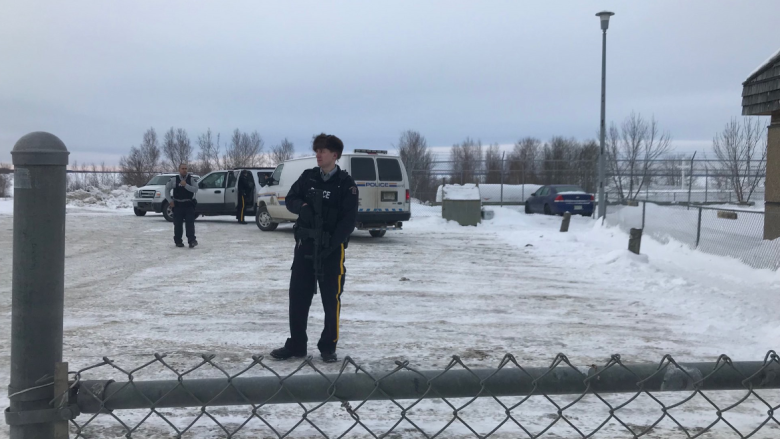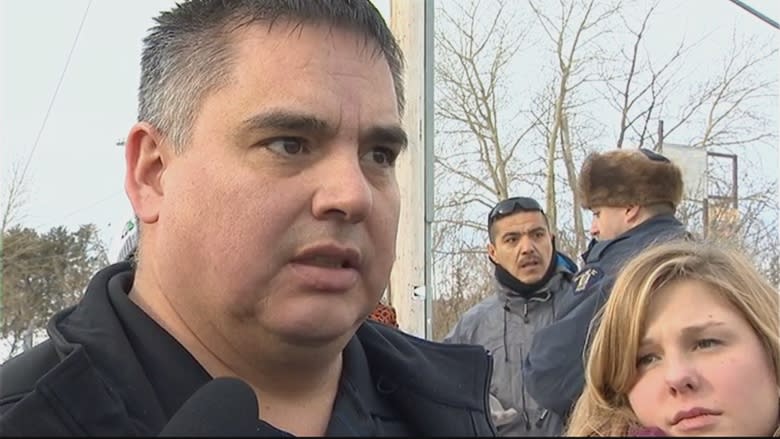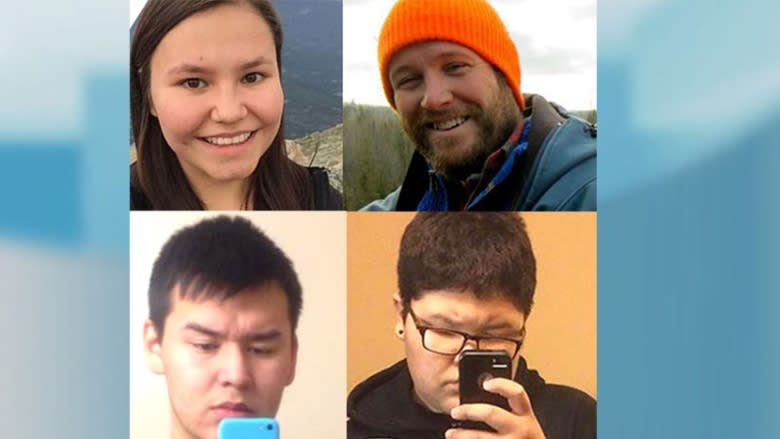Judge, RCMP deny responsibility for locking media out of La Loche courthouse
Both the judge presiding over the case and the RCMP say they were not responsible for reporters being locked out of the provincial courthouse where the La Loche, Sask., school shooter learned he will be sentenced as an adult.
The 34-seat courtroom was full on Friday morning, as people awaited the decision of the judge on whether the teen who pleaded guilty to the 2016 shooting spree would be sentenced as an adult or youth.
As the hearing got underway and the media and some community members were still outside, the door leading inside remained locked.
A CBC reporter was only allowed inside about an hour into Judge Janet McIvor's hour-and-a-half-long remarks.
McIvor "did not at any time order that the doors to the courthouse or courtroom be locked, or the media be prevented from attending," said a Saskatchewan courts spokesperson via email Friday.
The spokesperson said McIvor was not aware of what had happened "until the decision was complete" and that McIvor was "extremely dismayed" when she learned about it.
"It is the judge's understanding that these decisions were made by deputy sheriffs and the RCMP," the spokesperson added.
RCMP denies locking doors
In its own emailed statement Friday, the RCMP denied locking any doors at the courthouse but said it took its responsibility for security at the building "seriously."
The teen shooter, who can't be identified because of his age at the time of the shootings, was led into the courtroom under armed guard by several RCMP officers — a setup determined following "a thorough risk assessment," the RCMP said.
"For security reasons and to ensure public safety, the RCMP was unable to allow additional people access to the main lobby area of the building," the statement continued. "At no time today did RCMP members present lock any doors at the courthouse."
The RCMP did not decide on the venue, it added.
'A need to balance media access'
While it remains unclear how it happened, the lockout of media speaks to a lack of understanding about the importance of the "high profile" case, says the co-director for the Canadian Journalists for Free Expression.
"There really was a need to balance media access to this court, which is really a fundamental principle," said Duncan Pike.
The judge had decided to hold this hearing in La Loche to allow the community to participate, with the court deciding the priority was to accommodate victims and their families in the smaller space, according to the Ministry of Justice.
The ministry provided CBC News a recording of the judge's full remarks later on Friday. The ministry had also provided a live video feed of the court proceeding in Meadow Lake, located about 350 kilometres south of La Loche.
The teen shooter, who cannot be named due to a publication ban, pleaded guilty in October 2016 in Meadow Lake provincial court to two counts of first-degree murder, two counts of second-degree murder and seven counts of attempted murder.
His next court appearance is scheduled for March 16 in Meadow Lake, where the rest of his on-again, off-again sentencing hearing has taken place.
Keeping justice system fair and accountable
La Loche Mayor Robert St. Pierre noted some community members were able to attend to hear directly from the judge, and far fewer of them could have attended if the decision had been delivered in Meadow Lake, Sask.
"It's the venue," he said when asked about some community members, alongside the media, not being allowed inside because the courtroom was full. "It's the size of the community we have and the courtroom that we have is the size it is."
Crown prosecutor Pouria Tabrizi-Reardigan didn't comment on media access but said the small space was a factor when considering whether to hold the previous court proceedings in La Loche or Meadow Lake.
"It was very important for the court that the final decision be given in this community because the crimes had impacted this community," he said.
Bill Johnson, a Regina lawyer, says open courts are an important concept, but the Supreme Court of Canada has recognized a couple of "practical limits" that might justify closing courts.
One limit includes a constrained physical space, while another recognizes that a judge may, in some cases, choose to exclude any or all members of the public during proceedings, according to Johnson.
"It is a rare use of the Criminal Code statutory power, but it is not unheard of," he said.
Pike said media access to the courts is mandated by law and any exceptions must be justified by the court on a case-by-case basis. However, it's rare for such an exception to be put in place and this may only take place in certain circumstances, for instance, when a child has been a victim of crime, he said,
"Citizens' knowledge of what happens in court room ensures the judicial system is fair, just and accountable," he said. "That has to be taken into account."
The 2016 shooting engendered widespread interest and the courts should have anticipated there would be interest from others, outside of the community, in attending the sentencing, said Pike.
'It needs to be covered'
This is why Canadian Journalists for Free Expression has advocated for having cameras in the courtroom, Pike said, noting it would allow more people to have access to courtrooms, even in the face of space constraints.
"This is obviously an important and crucial case that a lot of people are interested in, so it needs to be covered," Pike said.
"People outside of the courtroom need to be able to get that information and that's why reporters are there."





